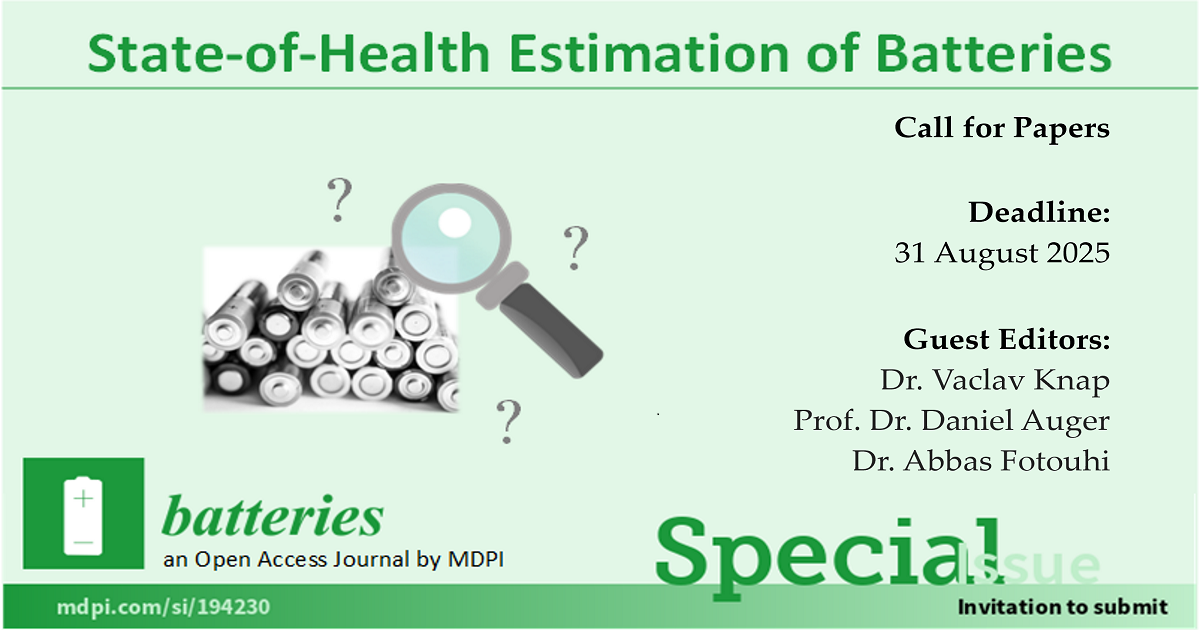- 4.8Impact Factor
- 6.6CiteScore
- 19 daysTime to First Decision
State-of-Health Estimation of Batteries
This special issue belongs to the section “Battery Performance, Ageing, Reliability and Safety“.
Special Issue Information
Dear Colleagues,
State-of-health (SOH) estimation of batteries remains a challenging goal. The typical behavior of lithium-ion batteries changes when the anode is doped with a high amount of silicon, highly affecting the accuracy of the estimation. There are novel chemistries worked on or being launched to the market, such as lithium-sulfur or sodium-ion batteries. Concepts of cloud battery management systems open new possibilities, especially in the trending area of machine learning and artificial intelligence. There are new and more demanding applications in the area of aerospace and second-life use. Moreover, ‘smart’ cells or packs are being proposed enhanced with additional sensors to provide extra information. These and more are making the topic of SOH estimation interesting and in high demand. Thus, we would like to encourage you to submit your contributions on the following SOH estimation topics covering:
- Modern lithium-ion batteries;
- Lithium-sulfur batteries;
- Sodium-ion batteries;
- Machine learning;
- Artificial intelligence;
- Cloud BMS;
- Smart cells and packs;
- Novel approaches;
- Remaining useful life.
Dr. Vaclav Knap
Prof. Dr. Daniel Auger
Dr. Abbas Fotouhi
Guest Editors
Manuscript Submission Information
Manuscripts should be submitted online at www.mdpi.com by registering and logging in to this website. Once you are registered, click here to go to the submission form. Manuscripts can be submitted until the deadline. All submissions that pass pre-check are peer-reviewed. Accepted papers will be published continuously in the journal (as soon as accepted) and will be listed together on the special issue website. Research articles, review articles as well as short communications are invited. For planned papers, a title and short abstract (about 250 words) can be sent to the Editorial Office for assessment.
Submitted manuscripts should not have been published previously, nor be under consideration for publication elsewhere (except conference proceedings papers). All manuscripts are thoroughly refereed through a single-blind peer-review process. A guide for authors and other relevant information for submission of manuscripts is available on the Instructions for Authors page. Batteries is an international peer-reviewed open access monthly journal published by MDPI.
Please visit the Instructions for Authors page before submitting a manuscript. The Article Processing Charge (APC) for publication in this open access journal is 2700 CHF (Swiss Francs). Submitted papers should be well formatted and use good English. Authors may use MDPI's English editing service prior to publication or during author revisions.
Keywords
- state-of-health
- remaining useful life
- lithium-ion batteries
- lithium-sulfur batteries
- sodium-ion batteries
- machine learning

Benefits of Publishing in a Special Issue
- Ease of navigation: Grouping papers by topic helps scholars navigate broad scope journals more efficiently.
- Greater discoverability: Special Issues support the reach and impact of scientific research. Articles in Special Issues are more discoverable and cited more frequently.
- Expansion of research network: Special Issues facilitate connections among authors, fostering scientific collaborations.
- External promotion: Articles in Special Issues are often promoted through the journal's social media, increasing their visibility.
- e-Book format: Special Issues with more than 10 articles can be published as dedicated e-books, ensuring wide and rapid dissemination.

